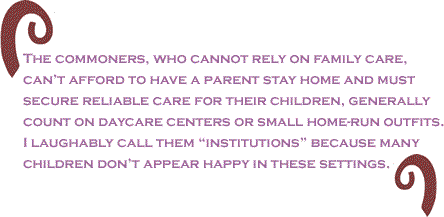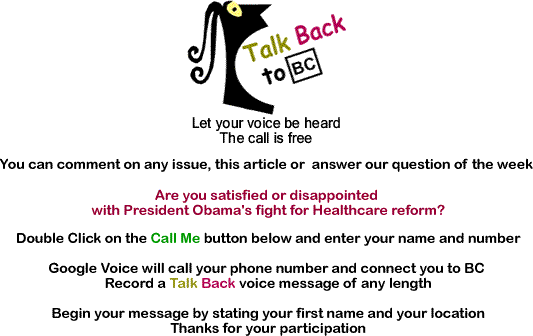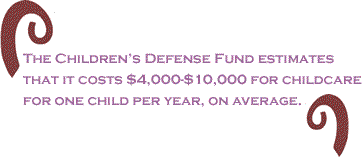
|
||||||||||||||||||||||

|
|
 |
|
| The process of educating our children begins the moment they enter the world. No, the foray isn’t so formal at the outset, as the primary parental motivations are the basic, essential needs of the infant – feeding, clothing, cocooning, protecting, loving, touching, bathing. We may buy organic baby food or make our own to help our child get the most nutrients in the most unadulterated form. We may purchase learning DVDs, like the “Baby Einstein” series to whet their intellectual appetites early and stoke the fires of curiosity. We may shy away from commercial cleansers and lotions in favor of baby-friendly soaps and natural body butters. All of these fundamental tasks are informed by the social, political, personal, familial, religious, philosophical and other imprints parents wish to instill in their children. In fact, the approaches are many and the concomitant rationales are as unique as the potentialities and personalities of the very children being raised. These efforts, acts and intentions are undertaken fervently, ferociously and fiercely in the hope that we propel our children forward. We want them to grow into healthy children who hit expected developmental benchmarks at the – or before – the right times. We want them to be readied – and ripened for the right opportunities at the right moments on all fronts – physiologically, anatomically, psychologically and socially. Of course, this is only the beginning. As you can see, the competition begins early, but the stakes strike higher and mightier just months after our babies come into the world. It begins with the issue of primary care taking during work hours. Stay-at-home motherhood is perceived as the province of the privileged (women whose husbands earn enough to support an upper-middle class or affluent household with all the expected perks and entitlements) – and the impoverished (those who may argue that their government aid or other programs render their would-be income pointless with the efforts of paid work and the need to secure childcare, which may consume most of their paycheck). Those women who don’t work or don’t have to work are edged out in envy by those women who don’t work AND have the means to employ a nanny. This nanny may assume care of the children while the mother gets a needed break or pursues other interests. For high-income working women, a nanny represents the best of the best in paid childcare. Then the battles of the daycare centers/pre-school programs take hold. The commoners, who cannot rely on family care, can’t afford to have a parent stay home and must secure reliable care for their children, generally count on daycare centers or small home-run outfits. I laughably call them “institutions” because many children don’t appear happy in these settings. In my many visits to different programs of all types, the overwhelming majority don’t comfort my maternal instincts. My internal alarms go off, the bells sound and the overwhelming signal is that something is awry. Organizations like Moms Rising are fighting to raise awareness about a number of issues that make the industrialized United States seem like an anachronism compared to its counterparts. Excellence in childcare is on the agenda – the Children’s Defense Fund estimates that it costs $4,000-$10,000 for childcare for one child per year, on average. Our monthly payments for full-time daycare were nearly as much as our mortgage, at the time, for Little Lady #1 during the first year of her life. Such expenses are uncomfortable, at best, and represent an all-out crisis for many. By the time Little Lady #2 enters Kindergarten, we would have spent about $50,000-$60,000 in childcare for both Little Ladies.
Little Lady #1 has been in some form of outsourced paid care since she was eight weeks old. She doesn’t appear to have been hampered or hurt by my never taking a respite from work and from her being in the care of others for most of her life. (Of course, for me, the guilt rages and the ire occasionally engages on the homestead from the inanity of the breakneck pace that has been my life.). Fortunately, Little Lady #2 was spared until just recently, when she began attending a childcare program, primarily for social exposure several days a week. Such an arrangement, not being in a commercial childcare setting for 40-50 hours a week, would not be possible without my parents, who pick up more than any grandparent’s share of the slack. So, how have you weathered the childcare conundrum? Daycare centers? Small, home-based childcare? Does family help pick up the pieces? Nanny? Have you opted to stay home because of one or more of the many considerations: costs, quality of care, hands-on involvement?
BLACK
MARRIED MOMMA are musings from BlackCommentator.com
Columnist K. Danielle Edwards - a Black full-time
working mother and wife, with a penchant for prose, a heart for
poetry, a love of books and culture, a liking of fashion and style,
a knack for news and an obsession with facts - beating the odds,
defying the statistics. Sister
Edwards is a Nashville-based writer, poet and communications professional,
seeking to make the world a better place, one decision and one action
at a time. To her, parenting is a protest against the odds, and
marriage is a living mantra for forward movement. Her work has appeared
in BLACK
MARRIED MOMMA, MotherVerse Literary Journal, ParentingExpress, Mamazine, The Black World Today, Africana.com, The Tennessean
and other publications. She is the author of Stacey Jones: Memoirs of Girl & Woman, Body & Spirit,
Life & Death |
|
 |
|
Any BlackCommentator.com article may be re-printed so long as it is re-printed in its entirety and full credit given to the author and www.BlackCommentator.com. If the re-print is on the Internet we additionally request a link back to the original piece on our Website. Your comments are always welcome. eMail re-print notice
If you send us an eMail message we may publish all or part of it, unless you tell us it is not for publication. You may also request that we withhold your name. Thank you very much for your readership. |
|
| |
|
| October
15 , 2009 Issue 346 |
|
| Executive Editor: Bill Fletcher, Jr. |
| Managing Editor: Nancy Littlefield |
| Publisher: Peter Gamble |
| Est. April 5, 2002 |
Printer Friendly Version
in resizeable plain
text format or pdf
format. |
 |

|
| |
| |









































